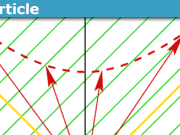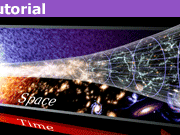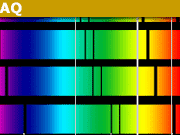At What Velocity Does the Universe Expand and Can It Be Faster than Light?
Neither of these questions actually makes sense in the form in which it was posed. To see why, let’s start by thinking about how we know the universe is expanding.
The expansion of the universe was originally discovered by Hubble, who found that the redshifts of galaxies were proportional to their distances from us. To keep things simple, let’s start by thinking about how this would be interpreted if we didn’t know about relativity, so that velocity and distance can be defined as we expect in Newtonian mechanics. A redshift of, say, 0.037% indicates that a galaxy is moving away from us at almost exactly 0.037% of the speed of light. Hubble’s observation therefore implies v=Hd, where v is the relative velocity of two galaxies, H is a number that is the same for all galaxies, and d is the distance between the two galaxies. All intergalactic distances are increasing by the same scaling factor in any given interval of time. This is exactly what happens, for example, when a piece of metal expands because it has been heated. When a piece of metal expands, we can’t describe its overall expansion using a velocity in units of meters per second. A velocity can only be defined if we first specify which two atoms in the metal we’re talking about. The velocity will be different if we pick a different pair of atoms. For similar reasons, it doesn’t make sense to ask for “the” velocity of expansion of the universe. There is not one velocity but many.
Now suppose we fix our attention on two specific galaxies. Can they be receding from one another at a speed greater than c? This question requires relativity. General relativity does not have a uniquely defined way of talking about the velocity of galaxy A relative to galaxy B if they are at cosmological distances from one another. If we like, we can verbally describe the situation by saying that both galaxies are at rest, but the space between them is expanding. If we like, we can use certain measures of distance and time (see: How are time and distance measured in cosmology?) and verbally describe A and B as moving relative to one another at a rate found by taking the change in distance divided by the change in time. In fact, general relativity allows us to assign absolutely any value we like to A’s velocity relative to B; it simply isn’t a well-defined thing. Therefore it doesn’t make sense to worry about whether such a velocity is greater than c. Because relative velocities of distant objects aren’t well defined in general relativity, there is no way to extend special relativity’s prohibition on v>c to distant objects in general relativity. The prohibition is a local one. Locally, general relativity is the same as special relativity.
You may sometimes see statements that cosmological inflation caused the universe to expand faster than c, or that the edge of the observable universe occurs at the place where the Hubble law gives a velocity equal to c. The first statement is incorrect because the expansion of the universe can’t be measured with a single velocity. The second statement is at best an oversimplification because relative velocities of distant objects are not well defined in general relativity. For one fairly natural definition of velocity, there are galaxies we observe that are now and always have been receding from us at a velocity greater than c.[Lineweaver]
Lineweaver — http://www.mso.anu.edu.au/~charley/papers/LineweaverDavisSciAm.pdf
Comments for this FAQ have been disabled
PhD in physics. I teach physics at Fullerton College, a community college in Southern California. I enjoy writing, playing viola, brewing beer, climbing and mountaineering.







